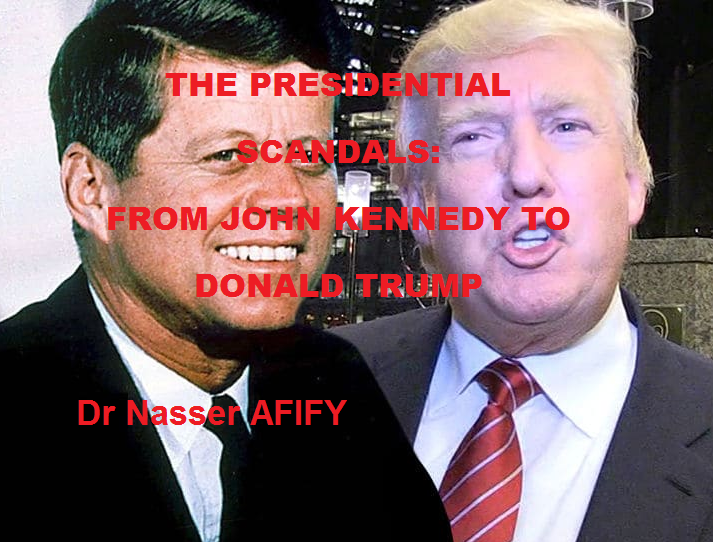
THE PRESIDENTIAL SCANDALS: FROM JOHN KENNEDY TO DONALD TRUMP
States based on principles and ethics always expect their leaders and politicians to respect these principles and morals and to set an example for the people and for other countries, especially if these leaders occupy the highest position in the country, which is the position of president. Although there are some say that politics has no morality and that it depends only on interests and that the ends justify the means, it has been proven through many historical events that these statements are incorrect and that those who stick to them end a tragic end and perhaps a scandal echoed over time.
The Constitution of the United States is one of the most powerful and most effective constitutions in the world. This Constitution has helped to create a balanced government. The balance between the federal and state governments has been maintained. The flexibility of the Constitution has been maintained and developed to put some restrictions to protect it from hasty changes.
Politician includes not only those elected, but also party officials, candidates for office, their staffs and appointees. Every president directly selects, appoints or hires several thousand people. Private citizens should only be mentioned when they are closely linked to the scandal or politician. This list also does not include crimes that occur outside the politician's tenure unless they specifically stem from acts made while in office and discovered later.
Scandal is defined as "loss of or damage to reputation caused by actual or apparent violation of morality or propriety". Scandals are separate from 'controversies', which implies two differing points of view and 'unpopularity'. Many decisions are controversial, many decisions are unpopular, and that alone does not make them scandals. Breaking the law is a scandal. The finding of a court is the sole method used to determine a violation of law, but it is not the sole method of determining a scandal. Also included as scandals are politicians who resign, quit, run, or commit suicide while being investigated or threatened with investigation.
Notoriety is a major determinant of a scandal, that is, the amount of press dedicated to it. Misunderstandings, breaches of ethics, unproven crimes or cover-ups may or may not result in inclusion depending on the standing of the accused, the amount of publicity generated, and the seriousness of the crime, if any. Drunk driving may be a conviction, but is usually too minor and too common to mention unless there are multiple convictions and/or jail time.
Given the political nature of congress in which the leading party has determining power, politicians who are rebuked, admonished, condemned, suspended, reprimanded, found in contempt, found to have acted improperly or used poor judgment, are not included unless the scandal is exceptional or leads to expulsion or conviction.
The history of American presidents is full of scandals ranging from sexual, financial and political scandals, some of which may amount to treason, when an external force is used to intervene in the elections in favor of a particular candidate against another candidate because this candidate will be indebted to that external force and demanding that He pays a lot of bills at the expense of his country's interests.
The Constitution of the United States is one of the most powerful and most effective constitutions in the world. This Constitution has helped to create a balanced government. The balance between the federal and state governments has been maintained. The flexibility of the Constitution has been maintained and developed to put some restrictions to protect it from hasty changes.
Politician includes not only those elected, but also party officials, candidates for office, their staffs and appointees. Every president directly selects, appoints or hires several thousand people. Private citizens should only be mentioned when they are closely linked to the scandal or politician. This list also does not include crimes that occur outside the politician's tenure unless they specifically stem from acts made while in office and discovered later.
Scandal is defined as "loss of or damage to reputation caused by actual or apparent violation of morality or propriety". Scandals are separate from 'controversies', which implies two differing points of view and 'unpopularity'. Many decisions are controversial, many decisions are unpopular, and that alone does not make them scandals. Breaking the law is a scandal. The finding of a court is the sole method used to determine a violation of law, but it is not the sole method of determining a scandal. Also included as scandals are politicians who resign, quit, run, or commit suicide while being investigated or threatened with investigation.
Notoriety is a major determinant of a scandal, that is, the amount of press dedicated to it. Misunderstandings, breaches of ethics, unproven crimes or cover-ups may or may not result in inclusion depending on the standing of the accused, the amount of publicity generated, and the seriousness of the crime, if any. Drunk driving may be a conviction, but is usually too minor and too common to mention unless there are multiple convictions and/or jail time.
Given the political nature of congress in which the leading party has determining power, politicians who are rebuked, admonished, condemned, suspended, reprimanded, found in contempt, found to have acted improperly or used poor judgment, are not included unless the scandal is exceptional or leads to expulsion or conviction.
The history of American presidents is full of scandals ranging from sexual, financial and political scandals, some of which may amount to treason, when an external force is used to intervene in the elections in favor of a particular candidate against another candidate because this candidate will be indebted to that external force and demanding that He pays a lot of bills at the expense of his country's interests.

